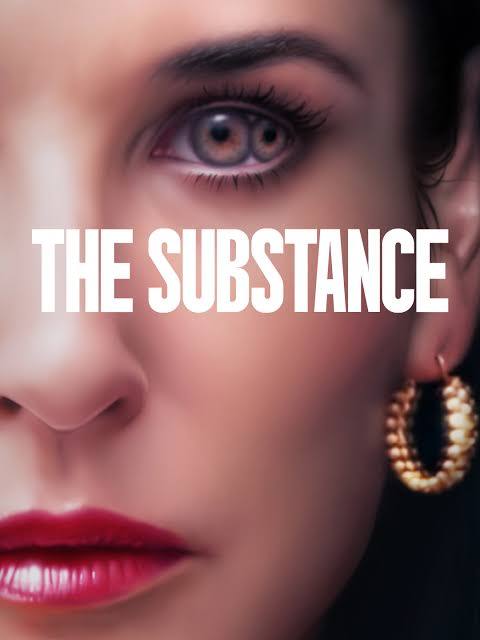
Editor’s note: This is a reoccurring column by Madison Sharrock, Managing Editor/Content, a film and production minor who reviews and critiques films.
Although I have never considered myself to be a fan of sci-fi horror films, watching “The Substance” changed the way I view the genre.
“The Substance” took on a sense of morality which audiences typically don’t see in other horror movies. Aside from horror, it also wasn’t a typical cult classic or coming-of-age movie where the main character learns to love themself.
The plot follows Elisabeth Sparkle, played by Demi Moore, famous for her ‘80s-style aerobics show, smothered in neon colors with a conventional TV-ready face. She encounters a black-market substance to evolve into an enhanced version of herself after she was fired from her gig on her 50th birthday.
Coralie Fargeat made a genius directorial decision to show the repulsing birth on Sparkle’s bathroom floor of her “younger, more beautiful, more perfect” self, Sue. Soon thereafter, this drastic juxtaposition with immediate consequences makes it clear that Sparkle injected a mistake.
I had never been a fan of scary movies because they would genuinely keep me up at night, thinking of what could be down the hall or in my closet. More specifically, after I watched “Hereditary” (2018), I feared what could be crawling on my ceiling while I sleep.
However, this film plays on a common dread among women: growing older.
Don’t be fooled; this is not your typical inspiring “be yourself” movie. It tells viewers to be themselves in the most gruesome, uncomfortable way possible– almost as a warning. Without spoiling the film, “The Substance” ends on a dramatized idea of what you can end up being, if not yourself, which is quite a difficult watch.
Sparkle and Sue, played by Margaret Qualley, had an interesting yet hateful dynamic, which is to be expected when you create a clone of yourself. The instructions of the substance tell users to “respect the balance,” and they must switch back every seven days. They begin to resent each other more and more each time they come to consciousness because of how the other version abused their timeline.
Sparkle’s boss, Harvey, is a character loosely based on Harvey Weinstein who is clearly past his prime to viewer’s standards but remains relevant in his powerful position over the production company. Many reviewers on Letterboxd argued that Harvey’s close-up, cringe-worthy shrimp eating scene was the most disturbing part of the film.
Moore, 62, won the Golden Globe Award for best actress in a motion picture from her performance after being in the industry for over 45 years. This was her first major acting accolade.
“Just know you will never be enough. But you can know the value of your worth if you just put down the measuring stick,” Moore said during her acceptance speech, which gave me goosebumps.
Her role and the award itself are a testament to all women that growing older does not affect your character nor heart the way it does your appearance. In a way, it made the idea of getting saggy and gray less scary to this 21-year-old.
I loved “The Substance,” if you couldn’t infer that from my five-star rating. From the cast to the editing, and even the accompanying audio and soundtrack, made for an experience I couldn’t forget even if I tried. What seemed to be a flat, satirical play on modern Hollywood turned out to be one of the most thought-provoking, horrifying films I have ever seen.
Personally, I would not take the substance solely based off the high maintenance of preserving the old and new versions of myself. However, things may change in a couple of decades; ask me again later. If I then say I would, remind me to watch this movie once more.
Although I have never considered myself to be a fan of sci-fi horror films, watching “The Substance” changed the way I view the genre.
“The Substance” took on a sense of morality which audiences typically don’t see in other horror movies. Aside from horror, it also wasn’t a typical cult classic or coming-of-age movie where the main character learns to love themself.
The plot follows Elisabeth Sparkle, played by Demi Moore, famous for her ‘80s-style aerobics show, smothered in neon colors with a conventional TV-ready face. She encounters a black-market substance to evolve into an enhanced version of herself after she was fired from her gig on her 50th birthday.
Coralie Fargeat made a genius directorial decision to show the repulsing birth on Sparkle’s bathroom floor of her “younger, more beautiful, more perfect” self, Sue. Soon thereafter, this drastic juxtaposition with immediate consequences makes it clear that Sparkle injected a mistake.
I had never been a fan of scary movies because they would genuinely keep me up at night, thinking of what could be down the hall or in my closet. More specifically, after I watched “Hereditary” (2018), I feared what could be crawling on my ceiling while I sleep.
However, this film plays on a common dread among women: growing older.
Don’t be fooled; this is not your typical inspiring “be yourself” movie. It tells viewers to be themselves in the most gruesome, uncomfortable way possible– almost as a warning. Without spoiling the film, “The Substance” ends on a dramatized idea of what you can end up being, if not yourself, which is quite a difficult watch.
Sparkle and Sue, played by Margaret Qualley, had an interesting yet hateful dynamic, which is to be expected when you create a clone of yourself.
The instructions of the substance tell users to “respect the balance,” and they must switch back every seven days. They begin to resent each other more and more each time they come to consciousness because of how the other version abused their timeline.
Sparkle’s boss, Harvey, is a character loosely based on Harvey Weinstein who is clearly past his prime to viewer’s standards but remains relevant in his powerful position over the production company. Many reviewers on Letterboxd argued that Harvey’s close-up, cringe-worthy shrimp eating scene was the most disturbing part of the film.
Moore, 62, won the Golden Globe Award for best actress in a motion picture from her performance after being in the industry for over 45 years. This was her first major acting accolade. “Just know you will never be enough. But you can know the value of your worth if you just put down the measuring stick,” Moore said during her acceptance speech, which gave me goosebumps. Her role and the award itself are a testament to all women that growing older does not affect your character nor heart the way it does your appearance. In a way, it made the idea of getting saggy and gray less scary to this 21-year-old.
I loved “The Substance,” if you couldn’t infer that from my five-star rating. From the cast to the editing, and even the accompanying audio and soundtrack, made for an experience I couldn’t forget even if I tried. What seemed to be a flat, satirical play on modern Hollywood turned out to be one of the most thought-provoking, horrifying films I have ever seen.
Personally, I would not take the substance solely based off the high maintenance of preserving the old and new versions of myself. However, things may change in a couple of decades; ask me again later. If I then say I would, remind me to watch this movie once more.


















